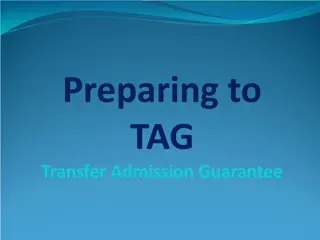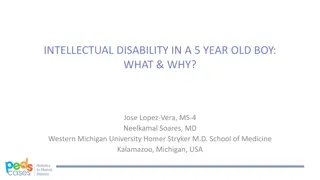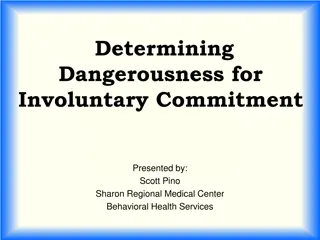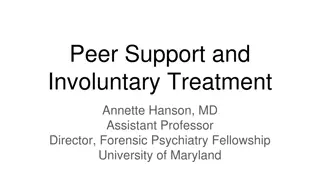Understanding Kentucky's KRS.202B Involuntary Admission Act for Intellectual Disability
Kentucky's KRS.202B allows for the involuntary admission of individuals with intellectual disabilities to Intermediate Care Facilities for Individuals with Intellectual Disability (ICF/IID). The process involves filing a petition in district court, evaluation by two certified evaluators, and coordination by the Department of Behavioral Health for admission. Admissions are not based on catchment areas, and placement is determined based on available space.
Download Presentation

Please find below an Image/Link to download the presentation.
The content on the website is provided AS IS for your information and personal use only. It may not be sold, licensed, or shared on other websites without obtaining consent from the author. Download presentation by click this link. If you encounter any issues during the download, it is possible that the publisher has removed the file from their server.
E N D
Presentation Transcript
KRS 202B: Involuntary Admission Act for Intellectual Disability
What is KRS 202B? KRS 202b grants authority to involuntarily admit an individual with an intellectual disability to an Intermediate Care Facility for Individuals with Intellectual Disability (ICF/IID) All admissions to ICF/IID in Kentucky must follow the process outlined in KRS 202b.
ICF/IID These programs are designed to provide specialized, intensive training to reduce the effects of intellectual disabilities through skill training and behavior management. There are four state owned ICFs/IID that provide care to individuals committed via KRS 202b process. ICF admissions are not based on catchment areas. Placement is determined by the Cabinet based on space available.
Overview of Admission Process A petition is filed in district court on behalf of an individual that indicates a need for involuntary admission related to intellectual disability. A judge will review the verified petition and order evaluation for admission if he/she feels that the petition provides sufficient information to support. Two evaluators will be ordered to complete an evaluation and certify whether or not the individual meets all 4 criteria for admission. The evaluators will submit their findings to the court and to DBHDID. If both evaluators determine that criteria has been met the individual will be ordered to be admitted to ICF/IID The Department of Behavioral Health, Developmental and Intellectual Disabilities will determine appropriate facility and coordinate admission.
Important Notes The process for evaluation and admission can take several days to complete. Filing a petition will not result in an immediate evaluation and admission as with KRS202a for individuals with a mental illness. If an individual is a danger to themselves or others as a result of a mental illness and needs acute psychiatric care, then KRS 202a admission process to psychiatric hospital should be followed, regardless of whether or not that individual also has an intellectual disability.
Proceedings for involuntary admission- Petition as set forth in KRS 202B.100 Proceedings for involuntary admission to ICF/IID are initiated in District Court where the individual lives or is currently located. The petition is completed by filling out form AOC-710. Documentation to support intellectual disability should be provided with the petition via psychological evaluation containing valid IQ testing. The petition shall be filed by a qualified professional in the area of intellectual disabilities, peace officer, county attorney, Commonwealth s attorney, spouse, relative, friend, or guardian of the person concerned. The court will review the allegations in the petition and examine the petitioner under oath to determine if there is probable cause in the petition to support involuntary admission.
Proceedings for involuntary admission- Evaluation If the court determines that probable cause for admission does exist, the court shall set a date for preliminary hearing and notify the individual, their guardian and appointed attorney and order the individual to be examined by two professionals to determine if criteria for admission is met. KRS 202B.100(6) The court will submit the order for evaluation (AOC-720) along with the petition (AOC-710) and supporting documentation of intellectual disability to DBHDID. DBHDID will assign evaluators to complete the examinations of the individual. Individuals do not have to be transported to another location while awaiting evaluation.
Proceedings for Involuntary Admission- Certification One certification must be a Qualified Intellectual Disabilities Professional (QIDP) employed by the Community Mental Health Center as assigned by DBHDID. KRS 202B.100(6)(c) The other certification must be completed by a licensed psychiatrist, psychologist or physician with special training and experience in serving individuals with intellectual disabilities as assigned by DBHDID who is employed by a state ICF/IID. KRS 202B.100(6)(c) The evaluators will each receive a copy of the order and certification form to complete with their findings from DBHDID. The evaluators will complete their evaluation without undue delay and submit their certification to the court and DBHDID within 24 hours of their examination.
Proceedings for Involuntary Admission- Disposition Once both certifications have been received the preliminary hearing will be completed and the court will review the certifications to determine if there is probable cause that the individual should be involuntarily admitted. Probable cause is determined to be met ONLY when BOTH examiners certify that the individual meets all four criteria for involuntary admission. KRS 202B.130 If one or both examiners determine that all criteria are NOT met, then the court will find that there is no probable cause and the proceedings shall be dismissed. KRS 202B.130
Proceedings for Involuntary Admission- Disposition An individual may be ordered for admission to ICF/IID at the preliminary hearing and prior to the final hearing or may remain in the community as determined by the court at the preliminary hearing. If the individual is admitted prior to the final hearing, the court will determine whether to transfer the case to the county where DBHDID has assigned admission or to retain jurisdiction in the county of origin. At the final hearing the court will determine whether to uphold the preliminary findings to support involuntary admission or will dismiss. If the individual is determined to be appropriate for admission then a final order will be given by the court to admit the individual to ICF/IID for an indeterminate period and will specify when the case shall be reviewed again by the court.
Criteria for Involuntary Admission 202B.040 The person is an individual with an intellectual disability as defined in 202B.010(9) moderate or severe ID The person presents a danger or threat of danger to self, family, or others as defined in 202B.010(4) The least restrictive alternative mode of treatment presently available requires placement in an ICF/IID as defined in 202B.010(8) AND Treatment that can reasonably benefit the person is available in an ICF/IID
Criteria for admission-Intellectual Disability Individual must have a moderate or severe intellectual disability Evaluators will determine severity of disability according to DSM-V criteria via review of records provided by the court as well as any other evaluation and treatment records available as well and as determined by their examination of the individual and other collateral information available. Intellectual disability and level of severity are determined by a combination of IQ score and adaptive functioning. Individuals with a mild or profound level of intellectual functioning will not benefit from treatment in an ICF/IID facility Individuals functioning within the mild level of severity will already have the skills that an ICF/IID would help an individual obtain Individuals functioning within the profound level of severity would be unable to acquire the skills that an ICF/IID would help an individual obtain Therefore individuals functioning within the mild or profound range would not be able to benefit from treatment in an ICF/IID If the individual s level of functioning is primarily affected by causes other than the individual s intellectual deficits (such as behavioral health disorder or medical condition) then the individual will not meet criteria
Criteria for admission-Intellectual Disability A variety of factors can impact an individual s performance on standardized IQ testing and therefore an IQ score alone does not determine intellectual disability. The individual must also have significant deficits in adaptive behavior, and have onset of disability prior to adulthood. The evaluator should review all records to determine if DSM criteria for intellectual disability are met. Adaptive functioning can be affected by a variety of factors and can change over time. Deficits must be directly related to intellectual impairment in order to meet criteria for intellectual disability. The evaluator should review the DSM criteria for severity levels for intellectual disability across all three domains (conceptual, social, and practical) to determine whether the individual is currently functioning in the mild, moderate, severe, or profound range of disability.
Criteria for admission-Danger or threat of danger There must be a clear indication that without admission the individual will be a threat to themselves or others. The danger must be related to the deficits caused by their intellectual disability. Individuals who have intellectual disability but present a danger primarily due to acute medical condition, behavioral health or substance abuse disorders, or criminal behavior do not meet criteria. The harm or potential for harm to self or others must be significant in nature.
Criteria for admission-Least restrictive mode of treatment Even if a person has very challenging needs, community treatment options should be exhausted before seeking institutionalization. It should be clear that the needed supports cannot be provided in a non-institutional setting. Teams should seek support and consultation from CMHC crisis teams and ICF specialty clinics to ensure that they have identified all potential alternative interventions. Individuals and/or guardians cannot select ICF placement as an alternative to community based supports or due to a specific preferred provider not being available
Criteria for admission-Can benefit from treatment ICF must provide the type(s) of treatment/support needed to address the current issues identified in petition for admission ICF are not acute medical or psychiatric facilities ICF do not have locked units The individual must be able to participate in treatment to improve functioning
Role of the evaluator Provide a thorough evaluation via review of records, clinical interview, information-gathering from individual and their team. Ensure that individuals meet all 4 criteria for involuntary admission prior to recommending admission Clearly document on certification form whether criteria has been met and the reasons the individual does or does not meet any or all of the criteria. Evaluators should be knowledgeable about what services and supports can be provided at ICF as well as community based service array. If evaluator identifies that less restrictive options are available to support the individual they can provide alternative recommendations to admission in their certification.
Completing certification forms Upon completion of evaluation, the evaluator shall submit the completed certification form to DBHDID AND the court within 24 hours of completing their assessment. If evaluator determines that involuntary admission is indicated (all 4 criteria are met) then the following items on the form should be selected Since this form is also used by the courts for proceedings for psychiatric hospital admission under 202A there are boxes related to mental illness, however these should not be checked for 202b certifications regardless of whether the individual does have a mental health diagnosis.
Completing certification forms If evaluator determines that involuntary admission is NOT indicated (any or all of the 4 criteria are not met) then the following items on the form should be selected
Completing certification forms To provide support for why the individual does or does not meet criteria, the evaluator should answer the questions on the form based on their comprehensive review of records and clinical assessment An evaluator may also choose to attach a separate written narrative that provides responses to these questions. The evaluator should indicate on the form that a separate document is attached with their responses.
Completing certification forms If items are hand-written the evaluator should ensure that it is clear and legible. All relevant fields should be completed. Name should be printed below the signature if it cannot be clearly read. Evaluator should provide their relevant credentials along with their signature (PhD, LPP, QIDP, LCSW, etc.)
Contact information and resources KRS 202b Questions about 202b process and submission of petitions and certifications Robin Cook 502-782-6208 robin.cook@ky.gov Crystal Adams 502-782-8883 crystal.adams@ky.gov CMHC crisis services brochure Home and Community Based Waivers ICF Specialty Clinics https://dbhdid.ky.gov/facilities/default.aspx Oakwood Specialty Clinic Hazelwood Specialty Clinic Lee Specialty Clinic
ICF services and supports Individuals who are admitted to ICF/IID are required to receive active treatment daily to improve skills and level of functioning Individuals are evaluated and receive a variety of services (e.g. positive behavioral supports, individual and/or group therapy, educational and vocational services, speech, occupational, physical therapy, and management of medical and psychiatric conditions. ICF teams work to identify appropriate community based supports and transition individuals back into less restrictive settings as quickly as possible. Discharge/transition planning begins at admission.
Post-transition and alternatives to institutionalization Individuals and their community team will receive ongoing support from ICF/IID interdisciplinary team for a year following their return to community to ensure a smooth transition. Re-admission to ICF/IID after transition will require a new petition, evaluation, and order for admission. ICF specialty clinics provide a variety of medical and allied specialty services on an outpatient basis. Individuals can contact any of the three specialty clinics directly to request services for consultation or ongoing treatment. Community Mental Health Centers offer crisis prevention and intervention services and behavioral health treatment. Home and Community Based Waivers offer a wide array of services through a large provider network to provide active treatment and supports to remain in the community.
Sample forms (double click to open PDF file with samples of all required forms for 202b process with instructions on how to complete them)























